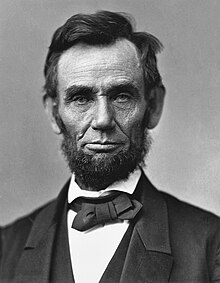
Back رئاسة أبراهام لينكون Arabic Kabinett Lincoln German Presidencia de Abraham Lincoln Spanish ریاستجمهوری آبراهام لینکلن Persian Abraham Lincolnin hallitus Finnish Présidence d'Abraham Lincoln French הקבינט של ארצות הברית בממשל אברהם לינקולן HE Presidenza di Abraham Lincoln Italian Kabinet-Lincoln Dutch Gabinet Abrahama Lincolna Polish
 | |
| Presidency of Abraham Lincoln March 4, 1861 – April 15, 1865 (Assassination) | |
| Cabinet | See list |
|---|---|
| Party | Republican (1861–1864) National Union (1864–1865) |
| Election | |
| Seat | White House |
|
| |
| Library website | |
| ||
|---|---|---|
|
Personal
Political
16th President of the United States
First term
Second term
Presidential elections
Assassination and legacy
 |
||
The presidency of Abraham Lincoln began on March 4, 1861, when Abraham Lincoln was inaugurated as the 16th president of the United States, and ended upon his assassination and death on April 15, 1865, 42 days into his second term. Lincoln was the first member of the recently established Republican Party elected to the presidency. Lincoln successfully presided over the Union victory in the American Civil War, which dominated his presidency and resulted in the end of slavery.
Lincoln took office following the 1860 presidential election, in which he won a plurality of the popular vote in a four-candidate field. Almost all of Lincoln's votes came from the Northern United States, as the Republicans held little appeal to voters in the Southern United States. A former Whig, Lincoln ran on a political platform opposed to the expansion of slavery in the territories. His election served as the immediate impetus for the outbreak of the Civil War. After being sworn in as president, Lincoln refused to accept any resolution that would result in Southern secession from the Union. The Civil War began weeks into Lincoln's presidency with the Confederate attack on Fort Sumter, a federal installation located within the boundaries of the Confederacy.
Lincoln was called on to handle both the political and military aspects of the Civil War, facing challenges in both spheres. As commander-in-chief, he ordered the suspension of the constitutionally-protected right to habeas corpus in the state of Maryland in order to suppress Confederate sympathizers. He also became the first president to institute a military draft. As the Union faced several early defeats in the Eastern Theater of the American Civil War, Lincoln cycled through numerous military commanders during the war, finally settling on General Ulysses S. Grant, who had led the Union to several victories in the Western Theater. Lincoln's 1863 Emancipation Proclamation recognized the legal freedom of the 3.5 million slaves then held in Confederate territory and established emancipation as a Union war goal. In 1865, Lincoln was instrumental in the passage of the Thirteenth Amendment, which made slavery unconstitutional. Lincoln also presided over the passage of important domestic legislation, including the first of the Homestead Acts, the Morrill Land-Grant Act of 1862, and the Pacific Railroad Act of 1862. He ran for re-election in 1864 on the National Union ticket, which was supported by War Democrats in addition to Republicans. Though Lincoln feared he might lose the contest, he defeated his former subordinate, General George B. McClellan of the Democratic Party, in a landslide. Months after the election, Grant would essentially end the war by defeating the Confederate army led by General Robert E. Lee. Lincoln's assassination in April 1865, five days after the surrender of Lee, left the final challenge of reconstructing the nation to others.
Following his death, Lincoln was portrayed as the liberator of the slaves, the savior of the Union, and a martyr for the cause of freedom. Political historians have long held Lincoln in high regard for his accomplishments and personal characteristics. Alongside George Washington and Franklin D. Roosevelt, he has been consistently ranked both by scholars and the public as one of the top three greatest American presidents, often as the greatest president in American history.
© MMXXIII Rich X Search. We shall prevail. All rights reserved. Rich X Search

